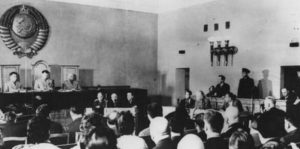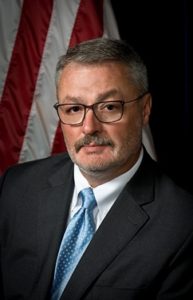Cardassia is a fictional planet in the Star Trek universe ruled by a totalitarian state with a court system quite similar to our own. Trials on Cardassia do not to examine the charges against the accused, since a guilty verdict is foreordained. The defendant is assigned an attorney called a “public conservator” whose role is not to represent the interests of his client, but rather to assure “the productive functioning of our courts.”
“I’m here to help you concede the wisdom of the state, to prepare you to accept the inevitable with equanimity,” one conservator explained to a bemused client unfamiliar with the system. “Whatever you’ve done, whatever the charges against you, none of that really matters in the long run…. This trial is to demonstrate the futility of behavior contrary to good order. Everyone will find it most uplifting.”
The federal conspiracy trial of Ammon and Ryan Bundy and five of their associates was supposed to follow the Cardassian script – but the prosecutors lost the plot when they encountered defendants they couldn’t bluff or bully, defense attorneys who conscientiously represented their clients, and a jury that demanded actual proof of the charges being considered.
After spending $12 million plundered from tax victims, US Attorney for Oregon Billy Williams had to wallow in his own failure when the jury acquitted the defendants of all charges but one (it deadlocked on a theft of government property charge against Ryan Bundy). This was not jury nullification – the act of refusing to apply an unjust law, or setting aside a legitimate law because of exceptional circumstances. Had the prosecution sought a conviction on trespassing charges, it would have won – but Williams and his minions arrogantly assumed that it wouldn’t be necessary to prove every element of its case. They mistakenly believed that they were putting on a show trial, but the jury wasn’t on the same page.
In search of consolation the armored geldings from the US Marshals Service assaulted and briefly detained defense attorney Marcus Mumford when he impudently reminded trial Judge Anna Brown that in the absence of the proper warrant all of the defendants were free to leave.
“I said `if the marshals have something to say about it let’s see what orders they have, let’s see what papers they have to take [them] into custody again,’” Mumford told the media following the assault. “Next thing I know they took a hold of me and [were] talking about how I was resisting arrest. They were twisting my legs and put me to the ground and then they tased me.”
One of Mumford’s putative colleagues in the criminal defense bar apparently believes that he deserved a beating.
“It’s a good result from the defense lawyer viewpoint,” sneered attorney Bob Reid in an email to Mumford and his colleagues following the not-guilty verdicts. “You all stood up to the overly arrogant prosecution and outplayed them, which is your job, and you did that very well.”
“But don’t drink the Kool-Aid which the defendants have been drinking,” Reid continued. These defendants “are not `good guys’…. Take your victory and feel great – you deserve it – but remember what it is, and what it isn’t.”
It is profoundly doubtful that Reid has ever written a snotty note of that kind to a defense attorney who obtained an acquittal for a defendant accused of an actual crime of violence – such as robbery, rape, or murder. The source of Reid’s revulsion is not the idea that a tangible crime against an individual victim remains unavenged, but rather that political offenders escaped punishment for “behavior contrary to good order.”
The protest occupation of vacant administrative buildings in the Malheur National Wildlife Refuge was a political act, not a crime of violence. It was a gesture defying the supposed authority of the federal government to put certain questions off-limits, such as this: By what supposed right does Washington claim to own most of the land in the western states, and to regulate most of the productive land that remains? Mumford’s demand to see a warrant before surrendering his acquitted clients into federal custody was a manifestation of exactly the same commendable defiance, which is why he was on the receiving end of an immediate reprisal by tax-fed purveyors of officially sanctioned criminal violence.
For reasons that should be obvious to the unprejudiced mind, the jurors who dared to subject the federal case to critical scrutiny are also concerned about potential reprisals. Their not-guilty verdicts place the jurors in incredibly rarefied company. By becoming a prosecution-driven enterprise, the federal criminal “justice” system has effectively abolished trial by jury. More than ninety percent of federal cases end with a plea bargain, and of the remainder a comparable percentage end in conviction – not because of the strength of the federal case, but because of the Regime’s insuperable material advantages.
Decades ago, at the depth of Stalin-era tyranny, Soviet procurators were admonished to pursue a one hundred percent conviction rate. Despite the advantages attendant to a one-party state, that goal evaded those who operated the Soviet “justice” system. Given that roughly one in 212 defendants in federal trials wins acquittal, it’s clear that the contemporary US system has come much closer to achieving Stalin’s ambition that its Soviet antecedent ever did.
In his Seattle University Law Review essay “Reflections on Russia’s Revival of Trial by Jury,” John C. Coughenour, the Chief United States District Judge for the Western District of Washington, describes how Russia embraced the western model of trial by jury in the late 19th Century, witnessed its destruction by the Soviets in 1917, and then saw its revival – however unlikely this may seem – under the rule of Vladimir Putin, who in December 2001 signed legislation mandating jury trials in all of Russia’s eighty-nine regions.
Immediately after seizing power in 1917, the Soviets “abolished the professional bar and trial by jury,” Coughenour recalls. Just sixteen years earlier, Bolshevik leader Vladimir Lenin praised the jury system as the “court of the street.” That was when he and his faction were the “whom,” rather than the “who.” When those roles reversed, Lenin had no compunction about disposing of the jury.
In its place the Soviets imposed an inquisitorial system of “people’s courts” consisting of one judge and six “assessors” who were locally elected after being screened by the Party apparatus. Although supposedly analogous to a jury, the assessors “became known as `nodders’ for simply nodding in agreement with the judge,” who “answered to telephonic instructions from Party officials,” Coughenour observes.
Where evidence was insufficient to achieve a conviction even under those circumstances, a judge “would usually return the case for `supplemental investigation,’ thus providing the prosecutor multiple bites at the apple,” continues Coughenour’s account. In our quasi-totalitarian system, this advantage is built into nearly every federal criminal case, in which US Attorneys front-load multiple charges, each containing draconian prison sentences, in the indictment.
Eleven of the original defendants in the Portland case succumbed to this familiar form of prosecutorial intimidation – but one of them, Ryan Payne, was emboldened by disclosures in the trial to file a motion to withdraw his guilty plea. Payne, who like Ammon and Ryan Bundy faces a separate trial in Nevada on charges arising from the April 2014 standoff in Bunkerville, entered a guilty plea as part of what is called a “global offer” dealing with both prosecutions. His federal public defender, Rich Federico, points out that the Feds did not fulfill their part of the bargain by making a plea offer on the Oregon charges.
When Payne signed the Oregon plea agreement, the Nevada plea offer was still “only in a draft format,” the motion recalls. “Notably, the entire `statement of facts’ section of the Nevada plea offer had been left blank.” It wasn’t until after Payne had signed the deal that he was told the stipulated facts to which he would be agreeing – and then given only a day to accept the deal or face a possible mandatory minimum seven-year sentence.
This arrangement, once again, brings to mind the unctuous assurances of the Cardassian “conservator” as he explains the rules of a show trial to his doomed defendant: “Whatever you’ve done, whatever the charges against you, none of that really matters in the long run.” All that mattered in that fictional dystopia was the need to vindicate the “authority” of the state. The same is true in the police states, both historic and contemporary, that inspired that science fiction allegory.
Unlike the Anglo-American adversarial system, “the Soviet inquisitorial criminal justice system neither prioritized nor emphasized the rights of individual defendants, but instead paid homage to the interests of the state,” concludes Judge Coughenour.
The same can, and should, be said of the system that routinely coughs up viscous specimens of statist arrogance like Billy Williams. To them, the most troubling aspect of the Portland acquittals is not merely the missed opportunity to demonstrate “the futility of behavior contrary to good order,” but the possibility that the “nodders” have awakened and are starting to think for themselve


































